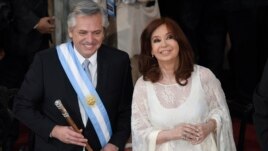10 December, 2019
Argentina's new president took office Tuesday as the country faces high inflation, concerns over the government's ability to pay its debts and rising poverty.
Alberto Fernandez was sworn-in as president in front of cheering lawmakers in Congress. In an hour-long speech, he promised a "new, fraternal and caring social contract."
Fernandez is considered part of the Peronist movement, which supports the political and social policies of the former general and President Juan Peron. Peron led Argentina from 1946 to 1955, and for two more years in the 1970s.

Argentina's new President Alberto Fernandez and Vice President Cristina Fernandez de Kirchner smile after they take the oath of office at the Congress in Buenos Aires, Argentina, Dec. 10, 2019.
The 60-year-old Fernandez heads a large coalition known as the Front for All. He is expected to support policies meant to increase economic growth.
Fernandez follows outgoing president Mauricio Macri, whose austerity policies aimed at cutting costs and paying debt were unpopular. It is unclear how new policies will affect the country's creditors and farmers, whose grain exports are important to the economy.
Supporters of Fernandez hope he can beat down Argentina's high inflation rate, which is near 50 percent. Poverty also is increasing as the economy remains in a recession.
Economic experts say his administration will need to hold talks with the International Monetary Fund to restructure more than $100 billion in loans.
Cuban President Miguel Diaz-Canel traveled to Buenos Aires for the inauguration ceremony. Brazil's President Jair Bolsonaro did not attend, however. Bolsonaro has disagreed with Fernandez publicly. This marks the first time since 2002 that a Brazilian president has not attended an inauguration in Argentina.
Fernandez named several members of his cabinet on Friday. Economy minister Martin Guzman is one person everyone will watch. Guzman is considered an expert in debt restructuring. But he has little experience in government. He is a follower of Joseph Stiglitz, the Nobel Prize-winning economist from Columbia University in New York. Stiglitz is known for his studies of markets and globalization.
Many investors have been worried that Fernandez will support more government influence in the economy. Critics consider his vice president a divisive former leader. Vice President Cristina Fernandez de Kirchner served as president from 2007 to 2015. During her years in office, Argentina failed to make payments on its foreign debt, continuing deep economic troubles for South America's second largest economy.
Political expert Julio Burdman told the Reuters news agency that Alberto Fernandez can expect to face many difficulties as president. "He needs to...get the economy started again, which will all depend on how he is able to handle the debt," Burdman said.
Because of high inflation, Argentine workers are seeing wages increase, while humanitarian groups are calling for more aid for the poor.
Recently, Fernandez spoke to a Buenos Aires radio station. "First thing we are going to do is start working on the issue of hunger. At the same time, we will get to work on the issue of debt," he said.
I'm Mario Ritter, Jr.
Nicolas Misculin wrote this story for the Reuters news agency. Mario Ritter Jr. adapted the story for VOA Learning English. George Grow was the editor.
___________________________________________________________
Words in This Story
fraternal –adj. friendly, brotherly, made up of members who share an interest or purpose
austerity –n. a situation in which less money is available and it is spent only on necessary things
globalization – n. the process by which companies and other organizations start operating in more than their home country